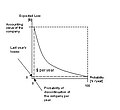Risk assessment
(Redirected from Health Risk Assessment)
Risk assessment is a systematic process of evaluating the potential risks that may be involved in a projected activity or undertaking. It is an integral part of planning and decision-making processes in various fields, including healthcare, business, and environmental science.
Definition[edit | edit source]
Risk assessment is defined as the identification and analysis of potential hazards that could negatively impact an individual's health, a business's operations, or an environment's condition. It involves the evaluation of the severity of the potential risk and the probability that the risk will occur.
Process[edit | edit source]
The process of risk assessment involves several steps:
- Identification of hazards: This involves determining what could potentially cause harm. This could be a physical object, a chemical substance, a biological agent, or a work process.
- Determination of who might be harmed and how: This involves identifying who might be affected by the hazard and how they might be harmed.
- Evaluation of risks: This involves determining the likelihood and severity of the potential harm.
- Implementation of control measures: This involves deciding on and implementing measures to eliminate or reduce the risk.
- Review of the assessment: This involves regularly reviewing the risk assessment to ensure it remains up-to-date.
Applications[edit | edit source]
Risk assessment is used in a variety of fields, including:
- Healthcare: In healthcare, risk assessment is used to identify potential health risks to patients and healthcare workers. This can include risks related to medical procedures, medication use, and infection control.
- Business: In business, risk assessment is used to identify potential risks that could impact a company's operations or financial stability. This can include risks related to market conditions, operational processes, and legal compliance.
- Environmental science: In environmental science, risk assessment is used to identify potential risks to the environment. This can include risks related to pollution, climate change, and biodiversity loss.
See also[edit | edit source]
Search WikiMD
Ad.Tired of being Overweight? Try W8MD's physician weight loss program.
Semaglutide (Ozempic / Wegovy and Tirzepatide (Mounjaro / Zepbound) available.
Advertise on WikiMD
|
WikiMD's Wellness Encyclopedia |
| Let Food Be Thy Medicine Medicine Thy Food - Hippocrates |
Translate this page: - East Asian
中文,
日本,
한국어,
South Asian
हिन्दी,
தமிழ்,
తెలుగు,
Urdu,
ಕನ್ನಡ,
Southeast Asian
Indonesian,
Vietnamese,
Thai,
မြန်မာဘာသာ,
বাংলা
European
español,
Deutsch,
français,
Greek,
português do Brasil,
polski,
română,
русский,
Nederlands,
norsk,
svenska,
suomi,
Italian
Middle Eastern & African
عربى,
Turkish,
Persian,
Hebrew,
Afrikaans,
isiZulu,
Kiswahili,
Other
Bulgarian,
Hungarian,
Czech,
Swedish,
മലയാളം,
मराठी,
ਪੰਜਾਬੀ,
ગુજરાતી,
Portuguese,
Ukrainian
Medical Disclaimer: WikiMD is not a substitute for professional medical advice. The information on WikiMD is provided as an information resource only, may be incorrect, outdated or misleading, and is not to be used or relied on for any diagnostic or treatment purposes. Please consult your health care provider before making any healthcare decisions or for guidance about a specific medical condition. WikiMD expressly disclaims responsibility, and shall have no liability, for any damages, loss, injury, or liability whatsoever suffered as a result of your reliance on the information contained in this site. By visiting this site you agree to the foregoing terms and conditions, which may from time to time be changed or supplemented by WikiMD. If you do not agree to the foregoing terms and conditions, you should not enter or use this site. See full disclaimer.
Credits:Most images are courtesy of Wikimedia commons, and templates, categories Wikipedia, licensed under CC BY SA or similar.
Contributors: Prab R. Tumpati, MD



